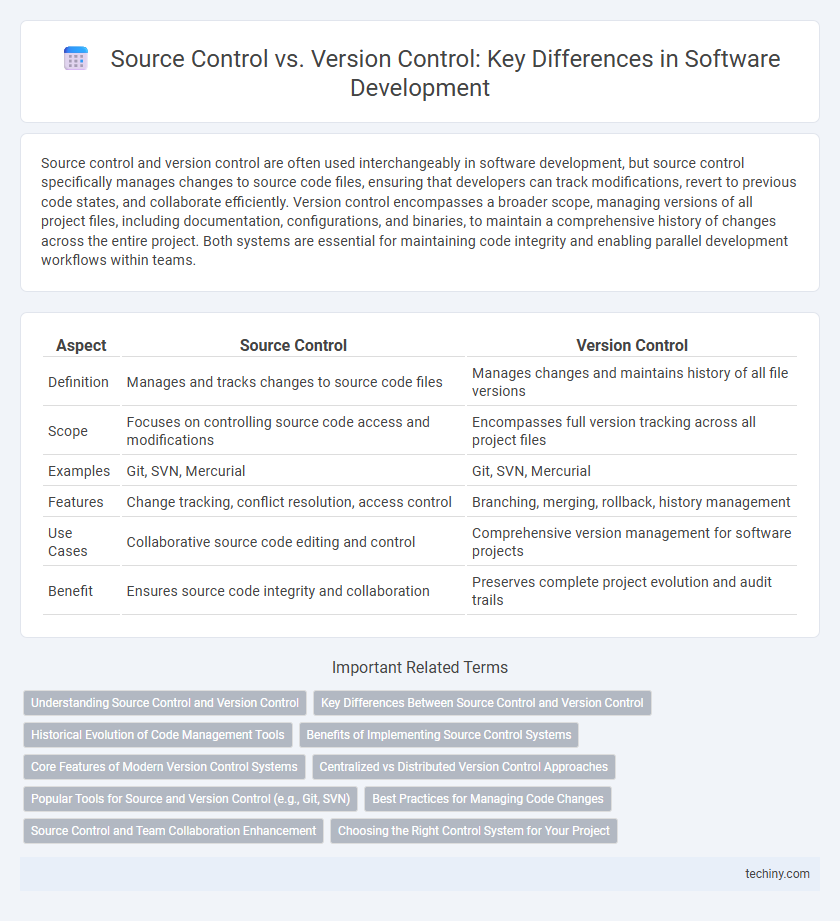Source control and version control are often used interchangeably in software development, but source control specifically manages changes to source code files, ensuring that developers can track modifications, revert to previous code states, and collaborate efficiently. Version control encompasses a broader scope, managing versions of all project files, including documentation, configurations, and binaries, to maintain a comprehensive history of changes across the entire project. Both systems are essential for maintaining code integrity and enabling parallel development workflows within teams.
Table of Comparison
| Aspect | Source Control | Version Control |
|---|---|---|
| Definition | Manages and tracks changes to source code files | Manages changes and maintains history of all file versions |
| Scope | Focuses on controlling source code access and modifications | Encompasses full version tracking across all project files |
| Examples | Git, SVN, Mercurial | Git, SVN, Mercurial |
| Features | Change tracking, conflict resolution, access control | Branching, merging, rollback, history management |
| Use Cases | Collaborative source code editing and control | Comprehensive version management for software projects |
| Benefit | Ensures source code integrity and collaboration | Preserves complete project evolution and audit trails |
Understanding Source Control and Version Control
Source control and version control both manage changes to code, but source control specifically tracks changes in source code files, enabling multiple developers to collaborate efficiently. Version control is a broader term encompassing any system that records changes over time, allowing rollback to previous states, branching, and merging of code. Popular tools like Git and Subversion exemplify version control systems that implement source control features for seamless project management and code integrity.
Key Differences Between Source Control and Version Control
Source control primarily manages changes to individual files, ensuring developers can track, revert, or branch specific source code segments, while version control encompasses broader project-wide change management, including tracking file sets, revisions, and collaboration histories. Source control systems often target single-user environments or simple projects, whereas version control systems support complex workflows, multi-user collaboration, and detailed history tracking across distributed or centralized repositories. Key differences include scope, functionality, and collaborative capabilities, with version control providing more robust tools for concurrent development and code integration.
Historical Evolution of Code Management Tools
Source control and version control systems have evolved from simple file management tools in the 1970s to sophisticated platforms like Git and Mercurial that support distributed development. Early systems such as SCCS and RCS introduced foundational concepts of tracking changes and maintaining code history, while modern tools enable branching, merging, and collaboration across global teams. The historical evolution highlights a shift towards decentralization, increased efficiency, and integration with continuous integration/continuous deployment (CI/CD) pipelines.
Benefits of Implementing Source Control Systems
Implementing source control systems in software development enhances collaboration by allowing multiple developers to work simultaneously without conflicts. These systems provide a comprehensive history of code changes, enabling easy rollback to previous versions and reducing the risk of data loss. Source control also improves code quality through automated merge conflict detection and facilitates continuous integration and deployment workflows.
Core Features of Modern Version Control Systems
Modern version control systems enable distributed collaboration by tracking changes with commit histories, branching, and merging capabilities that facilitate parallel development. These systems offer automated conflict detection and resolution, allowing seamless integration of concurrent code modifications while maintaining data integrity. Advanced version control tools also provide robust rollback mechanisms, detailed change logs, and access controls essential for secure and efficient software development workflows.
Centralized vs Distributed Version Control Approaches
Centralized version control systems (CVCS) like Subversion (SVN) maintain a single repository on a central server, allowing developers to check out and commit changes directly, which simplifies management but introduces a single point of failure and requires constant connectivity. Distributed version control systems (DVCS) such as Git and Mercurial enable each developer to have a full copy of the repository, providing enhanced offline capabilities, faster operations, and improved branching and merging workflows. The decentralized nature of DVCS fosters collaboration through peer-to-peer interactions, better history tracking, and resilience against server outages compared to the centralized approach found in traditional source control.
Popular Tools for Source and Version Control (e.g., Git, SVN)
Git and SVN are leading tools in source and version control, each offering distinct advantages for software development projects. Git excels with distributed version control, enabling multiple developers to work simultaneously with local repositories, while SVN provides centralized version control, maintaining a single source of truth ideal for centralized workflows. Both tools support branching, merging, and history tracking, but Git's popularity surged due to its flexibility, speed, and integration with platforms like GitHub and GitLab.
Best Practices for Managing Code Changes
Effective source control and version control systems are essential for managing code changes, ensuring seamless collaboration, and maintaining code integrity in software development. Best practices include using clear commit messages, branching strategies like Git Flow, and regular code reviews to track changes and avoid conflicts. Automating merges and leveraging continuous integration tools further enhance code quality and streamline development workflows.
Source Control and Team Collaboration Enhancement
Source control systems manage code repositories by tracking every change, enabling developers to collaborate seamlessly and avoid conflicts through branching and merging. These tools enhance team collaboration by providing real-time visibility into updates, facilitating code reviews, and maintaining a comprehensive history of code evolution. Effective source control reduces integration issues and improves software development productivity and quality in multi-developer environments.
Choosing the Right Control System for Your Project
Choosing the right control system for your software development project hinges on understanding the nuanced differences between source control and version control. Source control specifically manages changes to source code files, while version control encompasses a broader range of file types and project assets, enabling comprehensive history tracking and collaboration. Evaluate project size, team collaboration needs, and integration with development workflows to select tools like Git, Subversion, or Mercurial that align with your technical and operational requirements.
Source Control vs Version Control Infographic

 techiny.com
techiny.com